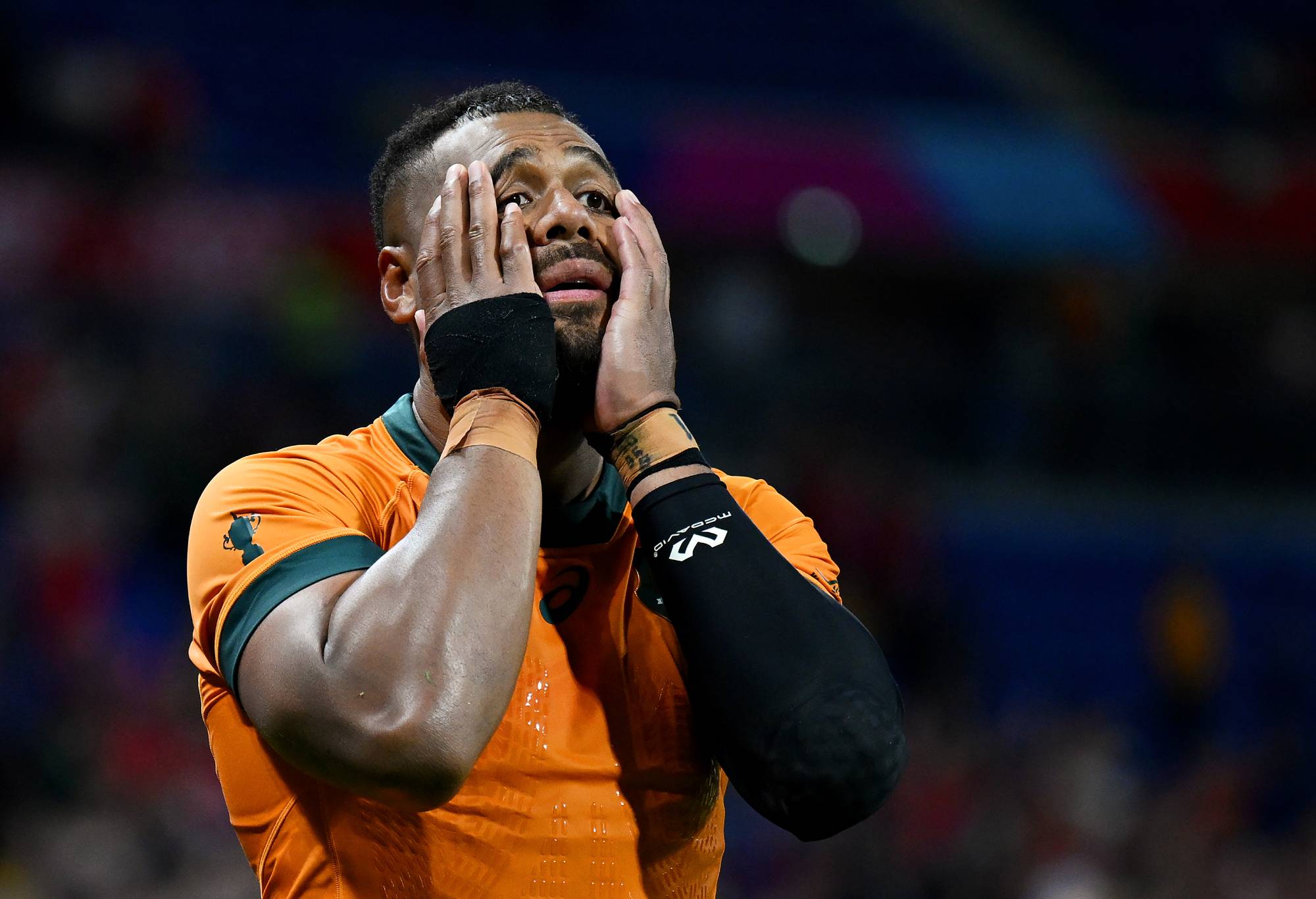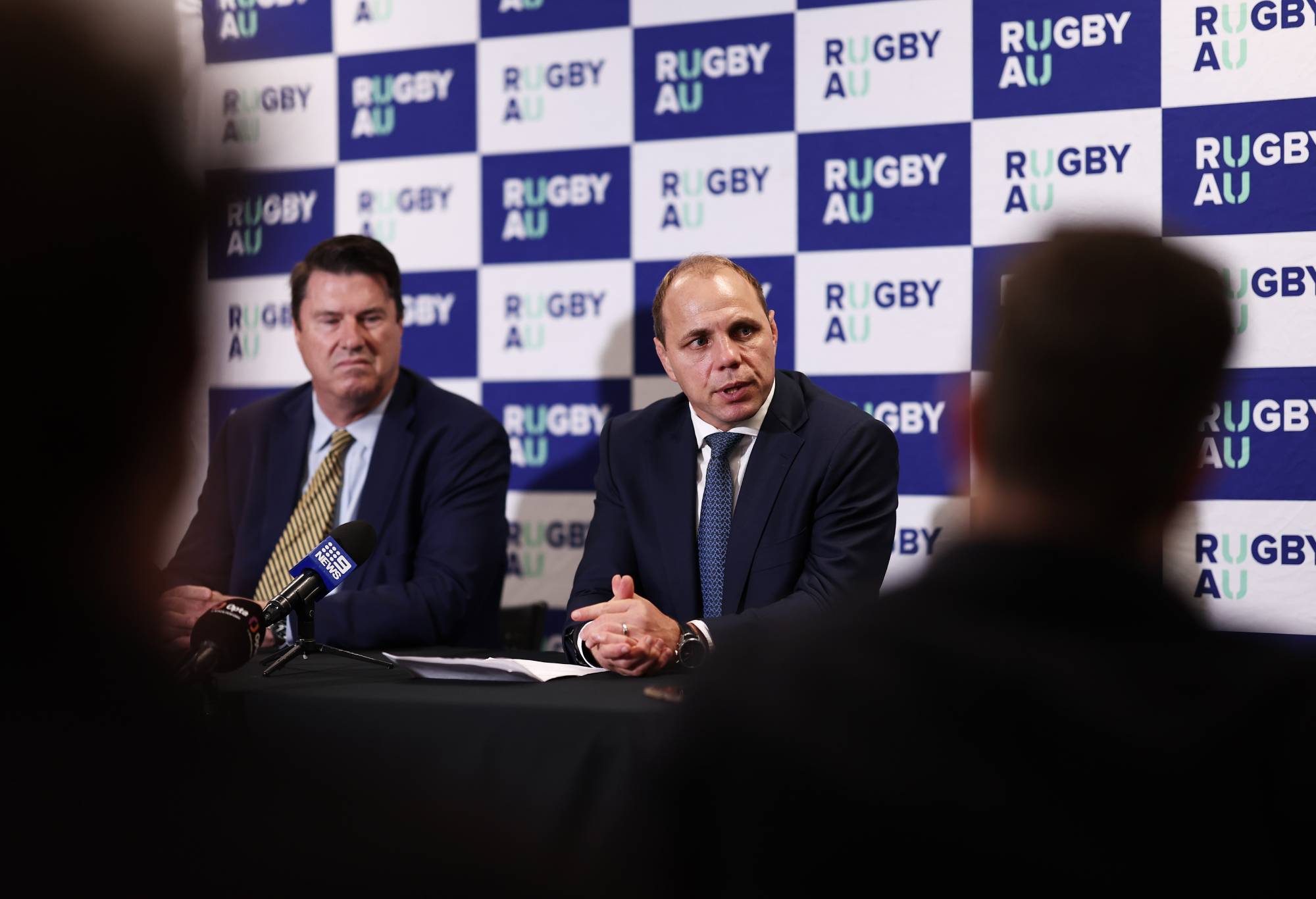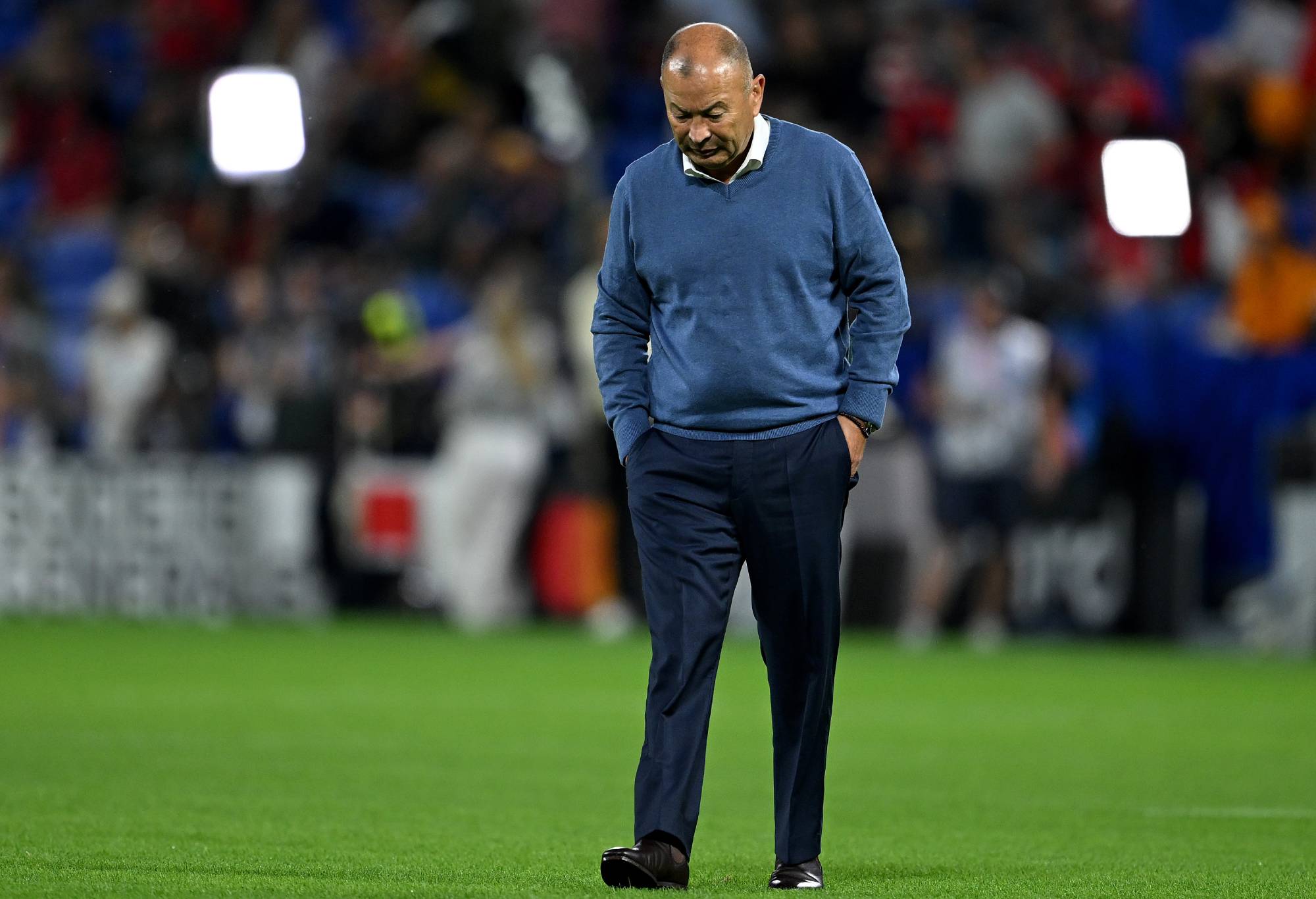SAINT ETIENNE – Rugby Australia’s push for structural reform threatens to be derailed, with certain factions within the member unions rallying support to call an Extraordinary General Meeting that threatens the leadership of Hamish McLennan and the entire board.
Sunday’s devastating record World Cup defeat to Wales, which has put the Wallabies on the brink of missing the knockout stage of the tournament for the first time, has increased tensions across the entire rugby landscape and plunged the future of Wallabies coach Eddie Jones into doubt.
With the game on a knife’s edge heading into the World Cup following a two-decade decline, whispers of plotting a coup started in the days following the Wallabies’ first loss to Fiji in 69 years.
The Wallabies’ 40-6 loss to Wales – their heaviest defeat in a World Cup match – has only intensified the mood within Australian rugby.

The Wallabies have won less than 40 per cent of Tests since 2016. (Photo by Hannah Peters/Getty Images)
RA’s desire to move towards a more aligned system, which includes centralised elements, had already ruffled feathers.
While RA, together with the five Super Rugby franchises, announced an agreement in principle to a “strategic reset” on August 23, not everyone is on board.
The Roar understands the ACT Brumbies and Queensland Reds, as well as the Western Force, have strong reservations about a move towards a more centralised system.
The Brumbies, particularly, are concerned that if they were to hand over their license, the franchise could be moved away from Canberra.
The Reds, meanwhile, feel like they are back on track after recovering from years of debt. The fact that they own Ballymore has left the Queensland Rugby Union in a strong position going forward.
Yet, there are deeply held reservations about whether they can trust RA and, indeed, if the right people are in charge and if they are best served to make critical decisions about the direction of the game.
The Wallabies’ humbling World Cup campaign, where RA’s decision to axe Dave Rennie and appoint Jones has, in the short-term at least, failed, has intensified that feeling.
It’s understood Queensland and the ACT are attempting to raise support for a potential intervention despite some mutual respect between Reds chairman Brett Clark and McLennan.
The state unions could call an EGM but currently don’t have the support to do so.
All eyes are on New South Wales, who are under huge financial strain and are backing the move towards a more aligned system. For now.
If they fall, so could RA.

RA chief executive Phil Waugh (R) and Hamish McLennan (L) are coming under pressure following the Wallabies’ humbling World Cup result. (Photo by Matt King/Getty Images for Rugby Australia)
The Constitution of Australian Rugby Union means that NSW, like Queensland, currently are entitled to three votes because they each have more than 50,000 rugby participants and have a Super Rugby franchise.
It means the other three Super Rugby franchises, which have less than 50,000 participants, have just two votes. While the Rugby Union Players’ Association also has a vote.
Part of the frustration from the Super Rugby franchises is the estimated $1.7 million that was withdrawn from RA following the most recent broadcast deal because of flagging costs.
The reduced amount of money given to the Super Rugby sides partly explains the governing body’s $8.2 million profit from 2022.
McLennan told The Roar on Monday that “Rugby in Australia needs a complete restructure.”
“The North has caught up to the South and we need a more centralised efficient structure to compete,” he said.
He added that “centralisation, “investing in players, grassroots and coaching” as well as “continuing to build our commercial assets and maximise our home World Cups” was essential.
RA points to the absence of Bledisloe Cup success since 2002 and the lack of continued success in Super Rugby, particularly since the Waratahs won their maiden and only title in 2014, as a decade-long malaise that will only intensify if they don’t come together to work closer together.
Indeed, since 2016, the Wallabies have won just 39.36 per cent of Tests from 94 Tests – a decrease from 41.9 per cent since Jones took over in January.
“This year has been an acceleration of an already steady decline. So let’s not say that everything was rosy and we’ve fallen off a cliff, we’ve been going downhill for a long, long time,” former Wallaby Morgan Tuirnui said on Stan Sport’s Between Two Posts.
Others like Ireland’s head of high performance David Nucifora, as well as respected rugby coach Andy Friend, who recently finished up at Connacht after five seasons at the Irish province, have both trumpeted centralised models.
“My experience having worked in the English premiership, Japan, Australia, and Ireland is that the Irish system is by far the most integrated and the most seamless,” Friend told The Roar.
“They call it ‘team of us’ and it’s everyone pushing to get the best out of the national team. And within that you’ve got competition, of course you do, and Nussi [Nucifora] was brilliant in driving that and brilliant in trying to get the balance of the best players playing football, and you need to have your home stream.”

Rugby Australia’s decision to appoint Eddie Jones as Wallabies coach has failed to bear fruit. (Photo by Hannah Peters/Getty Images)
Every review conducted by the Australian Rugby Union (now RA) since 2008 has pointed towards becoming more aligned, The Roar understands.
The issue is, RA has largely kept the review findings confidential and not engaged with the member unions.
Rugby insiders believe trust and respect are two of the biggest challenges facing the governing body’s desire to usher through reform.
Some of the state unions believe they are being bullied by the national body, while others have accused McLennan of saying one thing privately and another publicly.
Accountability is also another issue that many believe is cruelling their efforts.
Phil Waugh was on the board from 2018 before being appointed chief executive in June, while Daniel Herbert, who sits alongside his former Wallabies teammate on RA’s high-performance committee, has also been on the board since 2020.
Long-time RA figures like Ben Whitaker remain, too.
Former General Manager National High-Performance Adrian Thompson, who held several roles across RA, has only recently been let go after Waugh was appointed.
Waugh is currently looking at appointing a new head of high performance, with an announcement hoped before the end of the year.
There is also a perception that RA spends beyond its means.
Sources have also raised questions about why RA has seven community operators when that area of building the grassroots of the game is under the member unions’ umbrella.
It’s a duplication, which extends into sponsorship deals, that many can’t understand.
Those factors, including a widely held perception that for too long RA figures don’t surround themselves with people who challenge views and want to make tough decisions, have contributed to the distrust across the various member unions and their constituents.































































































